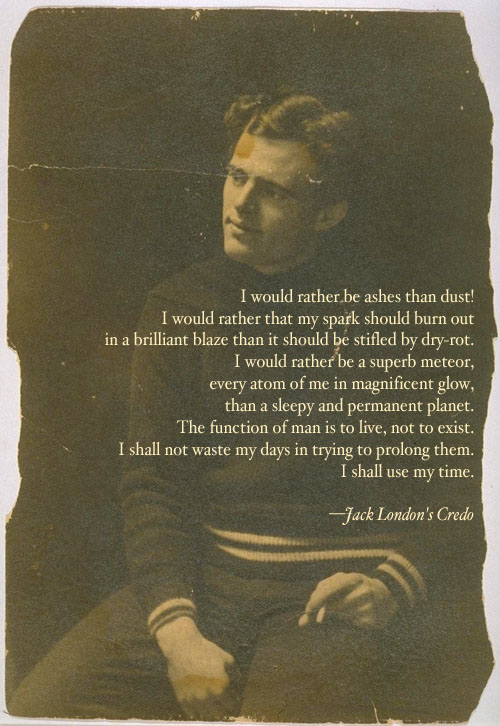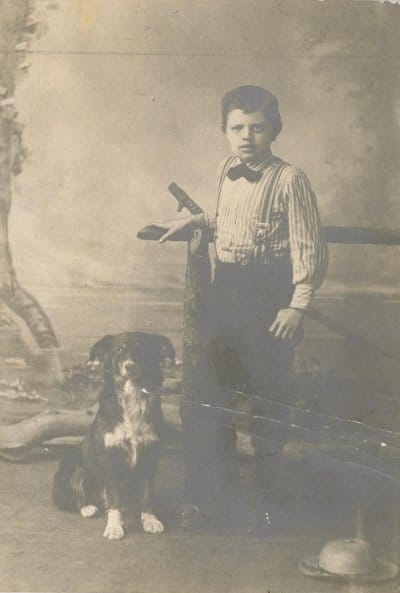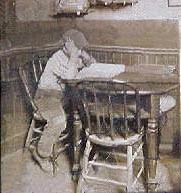
This article is part of a series that studies the life of Jack London, and especially his display of the Ancient Greek concept of thumos.
John Griffith London was born in San Francisco in 1876 the illegitimate son of Flora Wellman — a free-loving spiritualist who conducted séances in her home. He never knew his biological father. His mother was manipulative (when her stepdaughter was once asked what Flora’s profession had been, she answered “professional martyr”), emotionally unstable, and prone to temper tantrums, and she had little time or affection for her only child. She sent her infant son off to live with Virginia Prentiss, a former slave who acted as his wet nurse and first true mother figure. She called him “Johnny” (a name that would stick until he started referring to himself as “Jack” in his early teens), and he called her “Mammy Jennie.” Jack would remain loyal to Prentiss for the rest of his life.
Sometime in the first year or two of Jack’s young life, Flora took him back in. In his absence, she had married John London. Jack’s stepfather loved the boy like his own son, and took him hunting and fishing, providing him a refuge from Flora’s ever-changing moods. Jack would remember him as the best man he ever knew.
John did his best to support the family, but Flora, who fervently believed they would one day come into great wealth, squandered away the money on lottery tickets and misguided business ventures. The family frequently fell on hard times and moved regularly, placing Jack in the unenviable position of often being the new kid in school. Hungry and dressed “like a scarecrow,” he remembered enviously gazing at the meat-filled lunchboxes of his peers, a longing that led him to relish meat throughout his life and to feast to his heart’s content on barely-cooked duck and “cannibal sandwiches” (raw beef chopped fine with small onions) once he became successful.

Jack London in 1885, at age 9.
Jack was often lonely as a child and turned to books for companionship. Discovering the Oakland Public Library was a revelation, and its kindly librarian, Ina Coolbrith (who would become a literary celebrity in her own right), mentored the young boy and sparked his love of reading. As Jack remembers of that time, “I read everything, but principally history and adventure, and all the old travels and voyages. I read mornings, afternoons, and nights. I read in bed, I read at table, I read as I walked to and from school, and I read at recess while the other boys were playing.”
But Jack’s reading days and childhood would not last long. At age ten he was recruited to help support the family, a responsibility he would continue to shoulder until his death decades later. Young Jack became a newsboy, a job which required him to rise at three am to deliver the morning paper, head to school, and then go right from school in the afternoon to deliver the evening paper. On Saturdays he worked on an ice wagon and on Sundays he set pins at a bowling alley (no automatic re-setting machines in those days!).
Life as a paperboy left Jack little time for books, but being out on the streets provided a new kind of education. “I was busy,” he said, “getting exercise and learning how to fight, busy learning forwardness, and brass and bluff.”
Jack and His Skiff
“It was upon the liquid two-thirds of earth’s surface that I saw him the most blissfully content. Dawn or twilight, he loved the way of a boat upon the sea. His bright inquisitive spirit might have sailed to its human birthing, so native was he to the world’s watery spaces. The sea nurtured a gallant and adventurous spirit that made us all watch his banner. His influence was felt like a great vitalizing breath from the West—wide land of red-veined men—in which he lived and died. ‘Seamen have at all times been a people apart,’ curiously so, from the rest of their kind; and the sailor Jack London was a man apart from the rest of himself. Imagination, nerves, work, pleasure, all ran in smoother grooves when his feet stood between the moving surface and the blowing sky, his own intelligence the equalizing force amidst unstable elements. Seldom in waking hours without books or spoken argument exerting upon his wheeling brain, yet at the helm of his boat, braced for day-long hours, he would stand rapt in healthful ecstasy of sheer being, lord of life and the harnessed powers of nature, unheedful of physical strain, his own hand directing fate.” –Charmian London
Early in his life, Jack London heard the alluring call of the sea. Having devoured the tales of old voyagers, he desired a taste of the salt spray for himself. “I wanted to get away from monotony and the commonplace,” he remembered. “I was in the flower of my adolescence, a-thrill with romance and adventure, dreaming of wild life in the wild man-world.”
When he graduated from the eighth grade, London took the little money he had saved from his jobs that hadn’t been turned over to his family, bought a fourteen-foot skiff, and went about teaching himself how to sail. The San Francisco Bay and Oakland Estuary, full of treacherous shallows, strong currents, and commercial and fishing traffic, was no easy training ground for an inexperienced boy of just fourteen. Yet he toiled away, learning by trial and error, seeking to “master the manners of little craft until their management should become automatic to hand and brain.”
As he learned to sail, his little skiff became a place of contemplative solitude, where he could read and think, away from the chattering civilization on shore. His young mind began to ponder the big questions of life, measuring possible answers by his “one sure test”: “Will it work—will you trust your life to it?” At the same time, he honed his prowess for the very concrete problems of handling the boat in different conditions – his failure to do so creating the very concrete result of capsizing. It was here then, at sea, that London perhaps first began to develop his practical philosophy of life — his identity as both doer and thinker. It was here too that Jack first whet the hunger of his thumos for challenge – for the battle of man against the elements of nature – and began to gain the technical skills that lend confidence to thumos and enable it to seek greater adventures.
It was also while sailing his skiff that Jack got his first peek into the world of men – at least the kind of men he aspired to become. When a sixteen-year-old sailor asked London to put him aboard a ship, the Idler, sitting out in the bay, so that he might meet with a harpooner on board, Jack eagerly set sail. The Idler was rumored to take part in opium smuggling, and Jack had often sailed by it in his skiff, intrigued by its air of mystery and illegality. When Jack pulled alongside the large ship, the Idler’s caretaker invited both of the young men on board. As London, the sailor, and the nineteen-year-old harpooner headed below deck, Jack “followed with bated breath down the brassy companionway, and filled his lungs with the musty, damp odor of the first sea-interior he had ever entered.” He was utterly taken with what he saw in the cabin:
“The clothing . . . smelled musty. But what of that? Was it not the sea-gear of men?—leather jackets lined with corduroy, blue coats of pilot cloth, sou’westers, sea boots, oilskins. And everywhere was in evidence the economy of space—the narrow bunks, the swinging tables, the incredible lockers. There were the tell-tale compass, the sea-lamps in their gimbals, the blue-backed charts carelessly rolled and tucked away, the signal-flags in alphabetical order, and a mariner’s dividers jammed into the woodwork to hold a calendar. At last I was living.”
The three young strangers quickly became friends over numerous drinks and hours of storytelling and banter. When his companions had passed out in a stupor, Jack, determined to show his strength in being able to hold his liquor, climbed back topside and into his skiff. Though the sea was rough and choppy, he sailed through the black of night towards the Oakland shore, his whole being electrified in having briefly crossed over into the world of wild men:
“I set sail, cast off, took my place at the tiller, the sheet in my hand, and headed across channel. The skiff heeled over and plunged into it madly. The spray began to fly. I was at the pinnacle of exaltation. I sang “Blow the Man Down” as I sailed. I was no boy of fourteen, living the mediocre ways of the sleepy town called Oakland. I was a man, a god, and the very elements rendered me allegiance as I bitted them to my will.”
His companions on the Idler were not the only deep-water sailors with which London became acquainted. Young Jack began hanging out in saloons along the rough and tumble waterfront, spending much of his time in Oakland’s J.M. Heinold Saloon. Its proprietor, Johnny Heinold, soon saw that Jack was quite unlike the other patrons he had seen come and go. London frequented the saloon less for the company and the drinks, and more for the opportunity to study a large dictionary that sat in the window of that establishment. He could spend hours poring over its pages, trying to master new words. “Never a bit of attention would he pay to the men drinkin’ and smokin’ and jokin’ up here at the bar,” Heinold remembered, “he just fell to on that old book and read it like he’d like to learn everything in it.” If any of the other patrons wanted to harass him for his “sissy” interests, Jack was ready to stand up for himself. “He was gentler than a woman,” said Heinold, “yet he wasn’t to be walked over—I don’t care how big the guy was. He never fought much, but he’d set his jaw a certain way, and look with them flashing deep eyes of his, and that was all he needed to do. You see, he never bluffed.”

Young Jack London studying the dictionary at J.M. Heinold’s Saloon. The saloon’s name was changed in Jack’s lifetime to “Heinold’s First and Last Chance” and it remains in Oakland to this day.
Unfortunately for Jack, his first go as a sailor was cut short, as was his formal education. While he had been bringing home fish to his family as an economic justification for his days spent out on the skiff, they decided the young man needed to move on, not to high school, but to full-time employment.
An Adventurous Spirit, Canned
Jack found work at a cannery, stuffing pickles into jars for ten cents an hour. His official shift was a grueling 16 hours a day, seven days a week, but as London recalled, he was often required to labor even longer:
“Many a night I did not knock off work until midnight. On occasion I worked eighteen and twenty hours on a stretch. Once I worked at my machine for thirty-six consecutive hours. And there were weeks on end when I never knocked off work earlier than eleven o’clock, got home and in bed at half after midnight, and was called at halfpast five to dress, eat, walk to work, and be at my machine at seven o’clock whistle blow.”
There were “No moments,” London lamented, “here to be stolen for my beloved books.”
London felt his intellect and his thirst for adventure shriveling away. He began to despair of becoming a wage slave, with death his only out:
“I asked myself if this were the meaning of life—to be a work-beast? I knew of no horse in the city of Oakland that worked the hours I worked. If this were living, I was entirely unenamored of it. I remembered my skiff, lying idle and accumulating barnacles at the boatwharf; I remembered the wind that blew every day on the bay, the sunrises and sunsets I never saw; the bite of the salt air in my nostrils, the bite of the salt water on my flesh when I plunged overside; I remembered all the beauty and the wonder and the sense-delights of the world denied me. There was only one way to escape my deadening toil. I must get out and away on the water. I must earn my bread on the water…I wanted to be where the winds of adventure blew. And the winds of adventure blew the oyster pirate sloops up and down San Francisco.”
To those oyster pirate sloops is where we shall turn next time.
Read the Entire Jack London Series:
Part 1: Introduction
Part 2: Boyhood
Part 3: Oyster Pirate
Part 4: Pacific Voyage
Part 5: On the Road
Part 6: Back to School
Part 7: Into the Klondike
Part 8: Success at Last
Part 9: The Long Sickness
Part 10: Ashes
Part 11: Conclusion
_________________
Sources:
Wolf: The Lives of Jack London by James L. Haley
Jack London: A Life by Alex Kershaw
The Book of Jack London, Volumes 1 & 2 by Charmian London (free in the public domain)
Complete Works of Jack London (all of London’s works are available free in the public domain, or you can download his hundreds of writings all in one place for $3, which is just plain awesome)
Tags: Jack London


